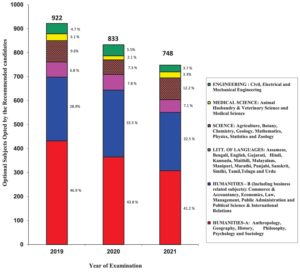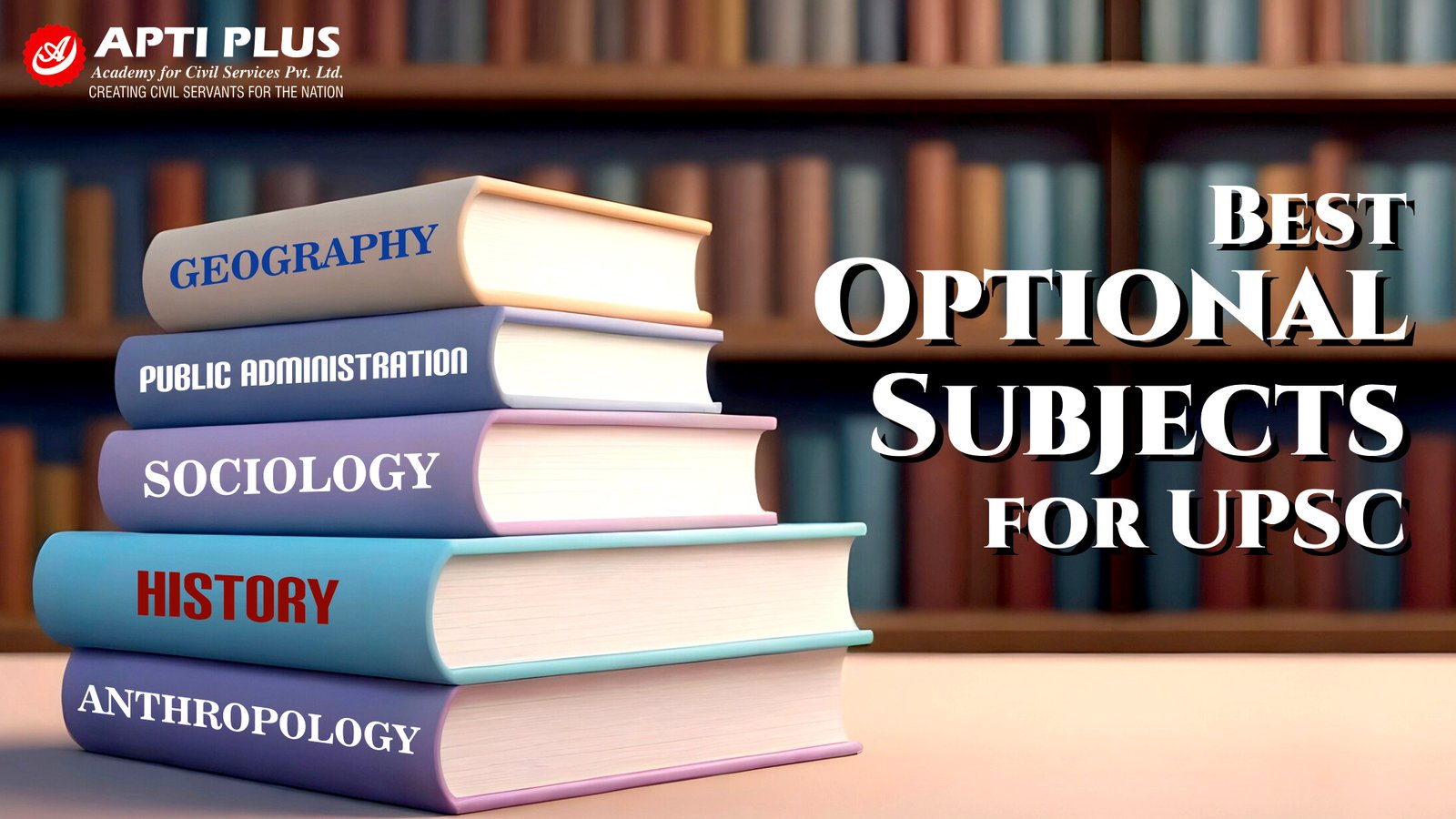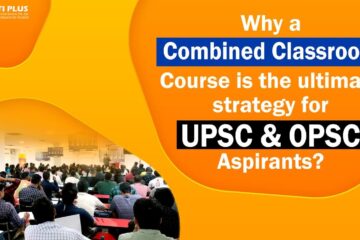Selecting right Optional Subject is an essential element of the UPSC Civil Services Examination preparation, and can significantly influence an aspirant’s success.
UPSC allows candidates to choose one optional subject from a wide range of disciplines, giving them the flexibility to opt for a subject aligned with their interests or academic background. The right choice of an optional subject for UPSC is crucial in shaping both the aspirant’s preparation approach and their overall performance in the examination.
Here, we provide the complete list of UPSC optional subjects to help candidates make a well-informed decision for their UPSC preparation. In addition, we will discuss strategies to determine the best optional subject by analyzing trends from previous years. Let’s start!
What is the Optional Subject in UPSC exam?
In the Civil Services Examination, UPSC provides a list of optional subjects from which candidates must select one for the mains exam. The optional subject consists of two papers, with each paper carrying 250 marks. Candidates can choose from a broad array of optional subjects, including literature subjects.
The examination papers for the optional subject is descriptive in nature, and each paper has a duration of three hours. Except for literature papers, all question papers are set in English. The optional subject is crucial in determining an aspirant’s overall score and success in the IAS mains exam.
UPSC Civil Services Optional Subjects
| S. No | List of Optional Subjects in UPSC |
| 1 | Agriculture |
| 2 | Animal Husbandry and Veterinary Science |
| 3 | Anthropology |
| 4 | Botany |
| 5 | Chemistry |
| 6 | Civil Engineering |
| 7 | Commerce & Accountancy |
| 8 | Economics |
| 9 | Electrical Engineering |
| 10 | Geography |
| 11 | Geology |
| 12 | History |
| 13 | Law |
| 14 | Management |
| 15 | Mathematics |
| 16 | Mechanical Engineering |
| 17 | Medical Science |
| 18 | Philosophy |
| 19 | Physics |
| 20 | Political Science & International Relations |
| 21 | Psychology |
| 22 | Public Administration |
| 23 | Sociology |
| 24 | Statistics |
| 25 | Zoology |
List of literature optional subjects in UPSC
The languages prescribed here are from the Eighth Schedule of the Indian Constitution.
| S.No | List of Literature Optional Subjects |
| 1 | Assamese |
| 2 | Bengali |
| 3 | Bodo |
| 4 | Dogri |
| 5 | Gujarati |
| 6 | Hindi |
| 7 | Kannada |
| 8 | Kashmiri |
| 9 | Konkani |
| 10 | Maithili |
| 11 | Malayalam |
| 12 | Manipuri |
| 13 | Marathi |
| 14 | Nepali |
| 15 | Oriya |
| 16 | Punjabi |
| 17 | Sanskrit |
| 18 | Santhali |
| 19 | Sindhi |
| 20 | Tamil |
| 21 | Telugu |
| 22 | Urdu |
| 23 | English |
Distribution of Candidates who Appeared vis-à-vis Recommended by Optional Subjects – Civil Services (Main) Examination, 2021
| Sl. No. | Optional Subject | Number of Candidates Appeared | Number of Candidates Recommended | Success Rate (%) |
| 1 | Agriculture | 115 | 12 | 10.4 |
| 2 | Animal Husbandry and Veterinary Science | 18 | 1 | 5.6 |
| 3 | Anthropology | 1159 | 90 | 7.8 |
| 4 | Botany | 32 | 3 | 9.4 |
| 5 | Chemistry | 127 | 14 | 11.0 |
| 6 | Civil Engineering | 135 | 10 | 7.4 |
| 7 | Commerce and Accountancy | 140 | 21 | 15.0 |
| 8 | Economics | 190 | 25 | 13.2 |
| 9 | Electrical Engineering | 117 | 7 | 6.0 |
| 10 | Geography | 1079 | 66 | 6.1 |
| 11 | Geology | 29 | 1 | 3.4 |
| 12 | History | 574 | 25 | 4.4 |
| 13 | Law | 180 | 21 | 11.7 |
| 14 | Literature of Bengali Language | 3 | 0 | 0.0 |
| 15 | Literature of English Language | 27 | 3 | 11.1 |
| 16 | Literature of Gujarati Language | 32 | 2 | 6.3 |
| 17 | Literature of Hindi Language | 211 | 22 | 10.4 |
| 18 | Literature of Kannada Language | 60 | 7 | 11.7 |
| 19 | Literature of Maithili Language | 12 | 2 | 16.7 |
| 20 | Literature of Malayalam Language | 74 | 8 | 10.8 |
| 21 | Literature of Manipuri Language | 2 | 1 | 50.0 |
| 22 | Literature of Marathi Language | 8 | 1 | 12.5 |
| 23 | Literature of Punjabi Language | 15 | 2 | 13.3 |
| 24 | Literature of Sanskrit Language | 34 | 2 | 5.9 |
| 25 | Literature of Sindhi (Devanagari) Language | 2 | 0 | 0.0 |
| 26 | Literature of Tamil Language | 27 | 2 | 7.4 |
| 27 | Literature of Telugu Language | 20 | 1 | 5.0 |
| 28 | Literature of Urdu Language | 7 | 0 | 0.0 |
| 29 | Management | 31 | 5 | 16.1 |
| 30 | Mathematics | 513 | 50 | 9.7 |
| 31 | Mechanical Engineering | 160 | 11 | 6.9 |
| 32 | Medical Science | 196 | 24 | 12.2 |
| 33 | Philosophy | 265 | 20 | 7.5 |
| 34 | Physics | 131 | 7 | 5.3 |
| 35 | Political Science and International Relations | 1571 | 140 | 8.9 |
| 36 | Psychology | 127 | 15 | 11.8 |
| 37 | Public Administration | 361 | 31 | 8.6 |
| 38 | Sociology | 1087 | 92 | 8.5 |
| 39 | Statistics | 3 | 0 | 0.0 |
| 40 | Zoology | 56 | 4 | 7.1 |
IAS Toppers Optional Subjects
UPSC Toppers 2023 Optional Subjects
| Rank | Topper Name | Optional |
| 1 | Aditya Srivastava | Electrical Engineering |
| 2 | Animesh Pradhan | Sociology |
| 3 | Donuru Ananya Reddy | Anthropology |
| 4 | P.K. Sidharth Ramkumar | Anthropology |
| 5 | Ruhani | Economics |
UPSC Toppers 2022 Optional Subjects
| Name | Rank | UPSC Topper Optional Subject |
| Ishita Kishore | 1 | Political Science and International Relations (PSIR) |
| Garima Lohia | 2 | Commerce and Accountancy |
| Uma Harathi N | 3 | Anthropology |
| Smriti Mishra | 4 | Zoology |
UPSC Toppers 2021 Optional Subjects
| All India Rank | Name | IAS Topper’s Optional Subject |
| 1 | Shruti Sharma | History |
| 2 | Ankita Agarwal | Political Science and International Relations (PSIR) |
| 3 | Gamini Singla | Sociology |
| 4 | Aishwarya Verma | Geography |
| 5 | Utkarsh Dwivedi | Political Science and International Relations (PSIR) |
| 6 | Yaksh Chaudhary | Sociology |
| 7 | Samyak S Jain | Political Science and International Relations (PSIR) |
| 8 | Ishita Rathi | Economics |
| 9 | Preetam Kumar | Mathematics |
| 10 | Harkeerat Singh Randhawa | Political Science and International Relations (PSIR) |
IAS Rank 1 Optional Subjects
| Year | Topper’s Name | Optional Subject |
| 2023 | Aditya Srivastava | Electrical Engineering |
| 2022 | Ishita Kishore | Political Science and International Relations |
| 2021 | Shruti Sharma | History |
| 2020 | Shubham Kumar | Anthropology |
| 2019 | Pradeep Singh | Public Administration |
| 2018 | Kanishak Kataria | Mathematics |
| 2017 | Anudeep Durishetty | Anthropology |
| 2016 | Nandini K. R. | Kannada Literature |
| 2015 | Tina Dabi | Political Science |
| 2014 | Ira Singhal | Geography |
| 2013 | Gaurav Agarwal | Economics |
| 2012 | Haritha V. Kumar | Economics |
| 2011 | Shena Aggarwal | Medical Science and Psychology |
| 2010 | S Divyadharshini | Public Administration |
Distribution of optional subjects opted by recommended candidates in 2019, 2020 and 2021

Debunking the myths
Before we discuss which optional is best for the UPSC CSE exam, let’s debunk some myths associated with optional subjects. At APTI PLUS, a leading UPSC coaching in Kolkata, we often encounter misconceptions that can mislead aspirants in their decision-making.
| Myth | Reality |
| Best optional is the one which is most trending/popular/highest success percentage… | UPSC never favors one optional over the other. The trend changes every year. It all boils down to one’s hard work. |
| Best optional is the one which is chosen by very few people… | It is incorrect to assume that if an optional has fewer students, it’s easier to score. Out of 500 students, 50 may succeed, while none out of 10 might pass. Ultimately, performance matters. But with more students, you have to outclass them to perform better. |
| Going with the flow: my friend has chosen, rank 1 has chosen, my coaching institute has asked… | The optional subject is a personal choice, like love marriage—you must love it. Arranged marriage doesn’t work here. |
| Choosing the optional which is the most scoring… | Technical subjects may be more scoring, but should someone from a commerce background take physics or math? Some of these subjects require over a year of dedicated time. There’s no standard that the same optional will be high scoring every year. |
| Choosing the optional which is your graduation subject… | Just because you graduated in a subject doesn’t mean you have interest or perfection in it. The UPSC syllabus may only match 60–70% with graduation. Choose it if you are comfortable with the UPSC syllabus, but never select it solely because it was your graduation subject. |
How not to choose an optional?
Don’t choose an optional subject:
- Just on the basis of one factor.
- Just because it is very scoring.
- On the basis of your intuition/feel-good factor—syllabus seems to be less or easy.
- Just because it is trending.
- Just because it has the highest success percentage.
- Going with the flow, because your friend or coaching institute has asked.
- Just because it was your graduation subject.
- Just because the topper had it.
Process for selecting an optional subject
| Step | Action |
| Step 1 | Take out a printout of the CSE Notification. |
| Step 2 | Read the optional list showing the 48 optional subjects. |
| Step 3 | Strike out the subjects you will not take no matter what (e.g., a commerce graduate won’t take Mechanical or Civil Engineering). Simultaneously, review the syllabus. |
| Step 4 | As the number of options reduces, eliminate with care, only if you’re 100% sure of not picking a particular subject. |
| Step 5 | You will now be left with 3–5 subjects. Consider the factors mentioned (e.g., personal interest, overlap with GS, etc.) and prepare a priority chart. |
| Step 6 | Rank the remaining subjects in order of priority (e.g., Philosophy > Public Administration > Sociology > History). |
| Step 7 | Choose the highest priority subject, read its basic books for a week to assess your interest. If it doesn’t suit you, move to the next option. |
| Step 8 | Finalize the optional subject. |
Sample priority chart
| FACTOR | SOCIOLOGY | ANTHROPOLOGY | GEOGRAPHY | PSIR |
| Interest in subject | Yes or No | Yes or No | Yes or No | Yes or No |
| Understanding ability | Yes or No | Yes or No | Yes or No | Yes or No |
| Graduation | Yes or No | Yes or No | Yes or No | Yes or No |
| Syllabus | Less/Moderate/Vast | Less/Moderate/Vast | Less/Moderate/Vast | Less/Moderate/Vast |
| Role of current affairs | Yes or No | Yes or No | Yes or No | Yes or No |
| Integration with GS syllabus | High/Medium/Low | High/Medium/Low | High/Medium/Low | High/Medium/Low |
| Analysis of PYQ | Mention familiarity level | Mention familiarity level | Mention familiarity level | Mention familiarity level |
| Teachers available | Yes or No | Yes or No | Yes or No | Yes or No |
| Materials available | Yes or No | Yes or No | Yes or No | Yes or No |
| Success rate in 2021 | 8.9 | 7.8 | 6.1 | 8.9 |
| Competition | 1087 | 1159 | 1079 | 1571 |
Conclusion
Choosing the right optional subject for the UPSC Civil Services Examination (CSE) is a crucial decision that can significantly influence a candidate’s success. However, various myths can cloud this important choice.
It is essential to recognize that there is no universally “best” optional for IAS exam; what works for one candidate may not work for another.
The idea that the most popular or trending subject guarantees success in UPSC CSE mains exam is misleading; the UPSC treats all subjects equally, and the trends can vary from year to year.
Additionally, the assumption that less commonly chosen subjects are easier to score in IAS mains exam is flawed.
Performance is not solely dependent on the number of candidates in a subject; it also relies on individual preparation and understanding of the syllabus of the optional subject. Candidates should approach their optional subject choice with a clear understanding of their interests and strengths rather than merely following the choices of peers or popular opinion.
It is also a misconception that opting for a optional subject related to one’s graduation or that is perceived as “high scoring” will ensure better results. A deep interest in the subject, coupled with thorough preparation, is far more significant than the subject’s popularity or scoring potential.
In summary, candidates should focus on personal interest and engagement with the subject matter, avoiding the pitfalls of making a choice based on superficial criteria. Following a systematic selection process for optional subject, as outlined, can guide candidates in making an informed decision that aligns with their strengths and preferences.
Ultimately, a well-thought-out choice in the optional subject, based on individual interests and thorough evaluation, is key to achieving success in the UPSC CSE.





